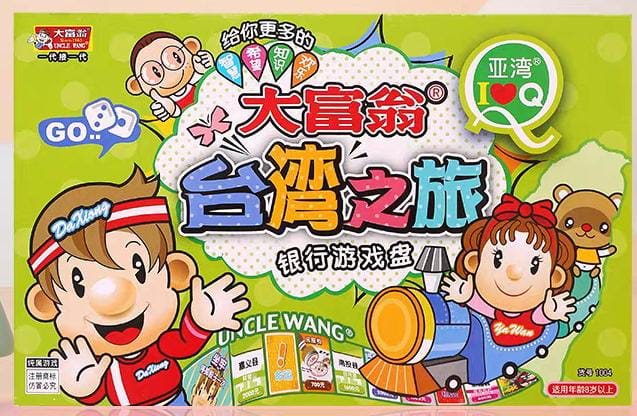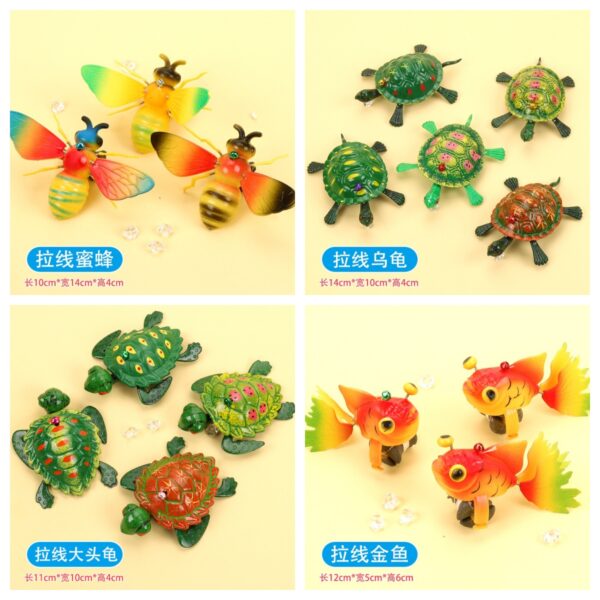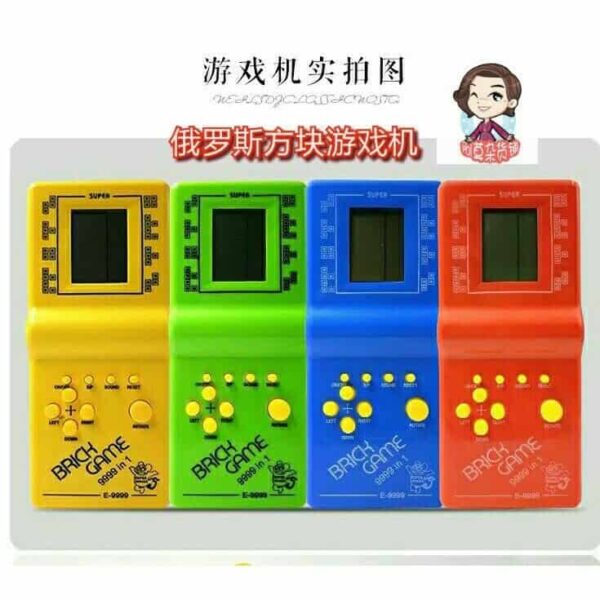Product Description
中文版:游戏介绍与详细玩法
一、游戏简介
「台湾之旅 银行游戏盘 Q版」是Uncle Wang大富翁系列的一款主题版本,以台湾各地景点或城市为格子背景、采用“银行游戏盘”机制(集中管理资金、拍卖机制)并且画风为Q 版卡通化,适合亲子或家庭娱乐。玩家透过购置台湾各地地产、收租、发展、交易,对抗其他玩家,以积累最多财富或成为最后一位未破产玩家为胜利目标。
二、组件(一般情况)
-
棋盘:格子设定为台湾各城市/地标(例如台北101、台中清水断崖、高雄港等)
-
玩家棋子:每位玩家选一个棋子代表自己
-
起始现金:每位玩家领取相同金额的纸币(具体金额以说明书为准)
-
地产卡/产权卡:与可购买格子对应
-
建筑物标志(如房屋、旅馆/升级标志)——视Q版简化情况而定
-
机会卡/命运卡(或主题卡牌,如“文化节事件”“観光热点”)
-
掷骰子或转盘,决定玩家移动步数
-
一名玩家担任银行家,管理纸币、地产卡、拍卖等
三、游戏目标
玩家通过投资地产、发展、收租金、与其他玩家交易,并避免破产,使自己的资产(现金+地产+建筑)不断增长。达到下列一种情况则游戏结束:
-
只剩一位玩家未破产,该玩家直接胜出;或
-
达到预设时间/回合结束后,资产最多者获胜。
四、游戏准备
-
将所有纸币、地产卡、事件卡、建筑物、棋子等组件准备好。
-
每位玩家从银行领取起始资金,金额统一。
-
地产卡与可購入格子配对放于银行区域备用。
-
指定一名玩家为银行家,负责资金发放、地产交易、拍卖主持。
-
每位玩家选择棋子,并将棋子置于“起点”格(通常为“出发”或“Go”格)。
五、游戏流程
按顺时针顺序轮流进行,每回合包括以下步骤:
-
掷骰子/转盘:玩家掷一或两颗骰子,或使用转盘决定移动格数。
-
若规则允许,掷出双数可能获得额外回合(视版本说明)。
-
-
移动棋子:玩家按掷出的点数将棋子向前移动对应格数。
-
落格执行:
-
若落在“未被购买”的地产格:玩家可选择用现金购买;若放弃,则进入银行家主持的拍卖,所有玩家可竞价。
-
若落在他人拥有的地产格:玩家需向该地产拥有者支付租金。租金数额根据地产类型、是否有建筑、属性组合等而定。
-
若落在“机会/命运/主题事件”格:抽取相应卡牌并执行说明(可能获得现金、支付罚款、移动至其他格、跳过回合等)。
-
-
发展机制:若玩家拥有某一色组(例如版上某个城市群或区域内所有地产)全部地产,并且规则允许建筑/升级,则可在这些地产上建造房屋或旅馆/升级标志,以提高租金收益。
-
交易与资金管理:
-
玩家之间可以自由交易地产/现金/卡牌。
-
若某玩家资金不足以支付租金或罚款,可选择将自己的地产抵押给银行/卖掉建筑物/与他人协商筹资。
-
若仍无法偿付,则该玩家宣告破产、退出游戏,其资产按银行规则处理。
-
-
回合结束:玩家完成其动作后结束回合。若玩家手中持有超过版上规定的卡牌或资金限制,应按规则调整/弃置。
-
胜利条件:一旦剩余仅一名玩家未破产,或游戏达到预定回合/时间或资产目标后,游戏结束;胜利者为资产最多者或唯一未破产者。
六、Q版与本版本特色
-
“Q版”代表可爱卡通风格,适合儿童或家庭游玩,可能比经典版简化玩法、缩短游戏时间。
-
本版主题是“台湾之旅”,地产名称、事件卡及画面可能为台湾城市、景点、本土元素,使玩家在游玩中亦能认识台湾地理文化。
-
银行游戏盘机制强调银行家角色、拍卖环节更加活跃,有利于培养玩家的金融概念与策略意识。
-
建议玩家人数为2‑4或2‑6人(视版本说明而定);适合年龄可能为6岁以上;预计游戏时间约20‑40分钟。
-
若本版采用转盘代替传统骰子,则移动机制可能略有变化。
🇬🇧 English Version: Game Introduction & Detailed Rules (Taiwan Tour Bank Game Board Q‑Edition)
1. Game Overview
The “Uncle Wang Monopoly – Taiwan Tour Bank Game Board Q Edition” is a themed version focused on Taiwanese cities and landmarks, featuring a central bank mechanism and cute “Q‑style” graphics. Players travel around Taiwan, purchase properties, collect rent, build developments, trade with others, and aim to accumulate the highest wealth or be the last player not bankrupt.
2. Components (Typical)
-
Game board: squares depicting various Taiwanese cities or famous landmarks (e.g., Taipei 101, Taroko Gorge, Kaohsiung Harbor)
-
Player tokens: each player chooses one.
-
Starting cash: each player receives the same amount from the bank.
-
Property Title Deed cards: corresponding to purchasable board squares.
-
Building tokens (houses/hotels) or upgrade markers (if permitted by version).
-
Chance/Event cards: themed for Taiwan tour events.
-
Dice or spinner: to determine movement steps.
-
Banker role: one player acts as bank manager handling money, property dealing and auctions.
-
Rulebook.
3. Objective
Through property acquisition, development, rent collection, trading and avoiding bankruptcy, players seek to maximize their total assets (cash + properties + buildings). The winner is either the player with the highest assets at game end or the last remaining player not bankrupt.
4. Setup
-
Prepare all cash, property cards, event cards, building pieces and player tokens.
-
Each player receives equal starting funds from the bank.
-
Shuffle the event cards and place them in the designated deck space.
-
Assign one player to act as the Banker (handles funds, property transactions and auctions).
-
Each player places their token on the “Start” square.
5. Gameplay
Players take turns in clockwise order. Each turn comprises:
-
Roll dice / spin spinner: determine how many steps to move.
-
If the version allows, rolling doubles may grant an extra turn.
-
-
Move token: move the number of steps rolled.
-
Landing action:
-
If you land on an unowned property: you may buy it from the bank. If you decline, the property is auctioned among all players (banker hosts).
-
If you land on someone else’s owned property: you pay rent to that player based on property type and building status.
-
If you land on a special square (Chance/Event/Tax/Jail etc): draw the event card or follow the square’s instructions (could get cash, pay fine, move, skip turn etc).
-
-
Development: If you own all properties of a colour group (as defined), you may build houses/hotels (if rules permit) to increase rent.
-
Trading & Financial Management:
-
Players may trade properties, cash and cards among themselves.
-
If you don’t have enough cash to pay rent/fine: you may mortgage properties, sell buildings or arrange a loan/trade.
-
If still unable to pay, you become bankrupt and are eliminated; your assets are handled per game rules.
-
-
End of Turn: your turn ends; if you hold more assets/cards than permitted (if edition imposes), adjust accordingly.
-
Winning the Game: game ends when only one player remains solvent or when a predetermined goal is reached; the richest or last‑standing player wins.
6. Q‑Edition Specific Notes
-
The Q‑Edition features simplified gameplay and family‑friendly visuals, often suited for younger players.
-
The Taiwan Tour theme adds local flavour with Taiwanese cities/landmarks as properties and event cards.
-
The Bank Game Board format emphasizes centralized banking, property auctions and active financial decision‑making.
-
Typical play: 2–4 or 2–6 players; recommended age: ~6+; estimated play time: ~20‑40 minutes (depending on version).
-
Check box for any variant features: e.g., spinner instead of dice, simplified development mechanics.







Reviews
There are no reviews yet.